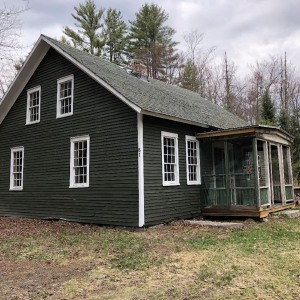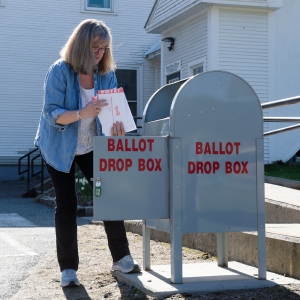Troubled timber industry joins trade association for voice in Montpelier
| Published: 10-11-2023 10:49 PM |
RANDOLPH — An Upper Valley timber harvest all but ruined by this summer’s flooding and persistent rain is one in a chain of challenges that have axed earnings
Looking for solutions, industry leaders have turned to a Maine-based trade association.
The nonprofit Professional Logging Contractors, or PLC, will bring the work it honed in Maine — advocating for the industry in matters of policy and workforce growth — to the Green Mountain State.
While a union speaks for employees, a trade association represents businesses. As revenue for logging contractors continues to flag, that sort of representation needed, said Sam Lincoln, owner of Lincoln Farm Timber Harvesting in Randolph.
Last December, dozens of Vermont contractors at a meeting in Barre came to a unanimous consensus that they wanted the trade association in the state, PLC Executive Director Dana Doran said. This summer, the expansion was made official.
As the 2024 legislative session approaches in January, the PLC plans to have a vocal presence in Montpelier, Doran said. On the agenda at the Statehouse for the association are initiatives to help with the financing of equipment and safety training, along with a state-funded study of the economic impacts of logging and timber trucking in Vermont.
Vermont’s forests cover nearly 80% of the state, according to the state’s Agency of Natural Resources. The state’s forest-based industry, which includes maple syrup and Christmas tree farms in addition to loggers, rakes in $861 million annually and directly employs around 6,600 people.
On top of a COVID-19 pandemic price bubble that burst this spring, and fuel and equipment costs driven up by inflation, loggers faced another challenge this summer, Lincoln said.
Article continues after...
Yesterday's Most Read Articles
 Dartmouth administration faces fierce criticism over protest arrests
Dartmouth administration faces fierce criticism over protest arrests
 Hanover house added to New Hampshire Register of Historic Places
Hanover house added to New Hampshire Register of Historic Places
 Sharon voters turn back proposal to renovate school
Sharon voters turn back proposal to renovate school
Timber harvesting is limited by ground conditions. Skidders driving over loose, damp ground can leave ruts and damage soil. Loggers prefer to work when the forest floor is frozen or dry.
But this summer, even before the flooding in July derailed harvest significantly, Lincoln’s logging equipment was parked for two weeks. Like many other sectors in agriculture, unrelentingly wet weather continued to foil his work.
A warmer-than-usual winter also kept the ground soft at a time when loggers usually gear up for a round of cold weather harvest.
Total timber yields have been decreasing across Vermont, according to the state’s Department of Forests, Parks and Recreation. Over a million cords of wood were logged from the state’s forest in 2018. Harvest issues, supply chain snags and contracting markets drew that number down to 900,000 two years later.
“We have first and fourth generation people working in the forests in Vermont,” Lincoln said. “I believe it’s a worthy occupation and that we provide an important service.”
Frances Mize is a Report for America corps member. She can be reached at fmize@vnews.com or 603-727-3242.

 Over Easy: On bread, buttered popcorn and big sandwiches
Over Easy: On bread, buttered popcorn and big sandwiches Judge won’t reconvene jury after disputed verdict in New Hampshire youth center abuse case
Judge won’t reconvene jury after disputed verdict in New Hampshire youth center abuse case
